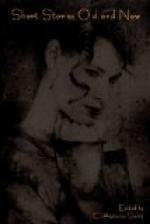Ernest began to speak, giving to the people of what was in his heart and mind. His words had power, because they accorded with his thoughts; and his thoughts had reality and depth, because they harmonized with the life which he had always lived. It was not mere breath that this preacher uttered; they were the words of life, because a life of good deeds and holy love was melted into them. Pearls, pure and rich, had been dissolved into this precious draught. The poet, as he listened, felt that the being and character of Ernest were a nobler strain of poetry than he had ever written. His eyes glistening with tears, he gazed reverentially at the venerable man, and said within himself that never was there an aspect so worthy of a prophet and a sage as that mild, sweet, thoughtful countenance, with the glory of white hair diffused about it. At a distance, but distinctly to be seen, high up in the golden light of the setting sun, appeared the Great Stone Face, with hoary mists around it, like the white hairs around the brow of Ernest. Its look of grand beneficence seemed to embrace the world.
At that moment, in sympathy with a thought which he was about to utter, the face of Ernest assumed a grandeur of expression, so imbued with benevolence, that the poet, by an irresistible impulse, threw his arms aloft, and shouted,—
“Behold! Behold! Ernest is himself the likeness of the Great Stone Face!”
Then all the people looked, and saw that what the deep-sighted poet said was true. The prophecy was fulfilled. But Ernest, having finished what he had to say, took the poet’s arm, and walked slowly homeward, still hoping that some wiser and better man than himself would by and by appear, bearing a resemblance to the GREAT STONE FACE.
VII. RAB AND HIS FRIENDS (1858)[*]
[* From “Rab and his Friends and Other Dogs and Men.”]
BY DR. JOHN BROWN (1810-1882)
[Setting. Dr. Brown was once driving with a friend through a crowded section of Edinburgh when he stopped in the middle of a sentence, seeming to be surprised at something behind the carriage. “Is it some one you know?” the friend asked. “No,” was the reply, “it’s a dog I don’t know.” Needless to say that “Rab and his Friends” is an Edinburgh story. The time is about 1824-1830. In the Scotch dialect “weel a weel” means “all right”; “till” means “to”; “I’se” means “I shall”; “he’s” means “he shall”; “ower clean to beil” means “too clean to suppurate”; “fremyt” means “strange”; “a’ the lave” means “all the rest”; “in the treviss wi’ the mear” means “in the stall with the mare.”




